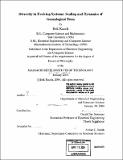Diversity in evolving systems : scaling and dynamics of genealogical trees
Author(s)
Rauch, Erik, 1974-
DownloadFull printable version (6.721Mb)
Alternative title
Scaling and dynamics of diversity in evolving systems
Other Contributors
Massachusetts Institute of Technology. Dept. of Electrical Engineering and Computer Science.
Advisor
Gerald Ray Sussman.
Terms of use
Metadata
Show full item recordAbstract
Diversity is a fundamental property of all evolving systems. This thesis examines spatial and temporal patterns of diversity. The systems I will study consist of a population of individuals, each with a potentially unique state, together with a dynamics consisting of copying or reproduction of individual states with small modifications to them (innovations). I show that properties of diversity can be understood by modelling the evolving genealogical tree of the population. This formulation is general enough that it captures interesting features of a range of natural and artificial systems, though I will pay particular attention to genetic diversity in biological populations, and discuss the implications of the results to conservation. I show that diversity is unevenly distributed in populations, and a disproportionate fraction is found in small sub-populations. The evolution of diversity is a dynamic process, and I show that large fluctuations in diversity can result purely from the internal dynamics of the population, and not necessarily from external causes. I also show how diversity is affected by the structure of the population (spatial or well-mixed), and determine the scaling of diversity with habitat area in spatial systems. Predictions from the model agree with existing experimental genetic data on global populations of bacteria. I then apply the method of modelling the genealogical tree of a population to further questions in evolution. (cont.) Using a generic model of a pathogen evolving to coexist with a population of hosts, I show that the evolutionary dynamics of the system can be better understood by considering the dynamics of strains (groups of individuals descended from a common ancestor) rather than individuals. A fundamental question in the study of evolution is how selection can operate above the level of the individual, and these results suggests a more general mechanism for such selection.
Description
Thesis (Ph. D.)--Massachusetts Institute of Technology, Dept. of Electrical Engineering and Computer Science, 2004. Includes bibliographical references.
Date issued
2004Department
Massachusetts Institute of Technology. Department of Electrical Engineering and Computer SciencePublisher
Massachusetts Institute of Technology
Keywords
Electrical Engineering and Computer Science.